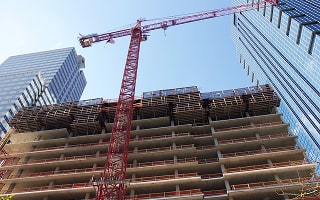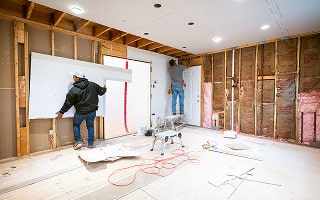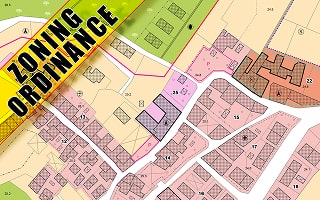Your Guide to Construction, Renovation, and Zoning Laws in Pennsylvania

Looking to buy property in Pennsylvania? Before proceeding, review all relevant construction, renovation, and zoning laws within the state to gain a better understanding of how they may impact your plans. According to Strategic Market Research, Pennsylvania has 5,839,963 residential properties. Pennsylvania has a total of 2,321,831 commercial properties.
Property-related laws fall into two general categories: state-level and local (including town, city, county, and municipality). Each state divides property law responsibilities between these two entities; some laws fall under the jurisdiction of the state, while others fall under the jurisdiction of local government. Under each main category, there are many different rules and regulations to review.
State Level (Regulations & Codes)

Pennsylvania's construction industry is governed by the Uniform Construction Code (UCC), which was established by the Pennsylvania Construction Code Act (Act 45 of 1999). The UCC provides consistent statewide standards for building safety and construction practices. As the state provides the framework, local municipalities are responsible for implementing and enforcing building codes; however, they can also adopt amendments that are more stringent, as long as these amendments don't weaken the statewide standards.
Some of the key highlights of Pennsylvania's building code are as follows:
- Adoption of International Codes: The Uniform Construction Code uses parts of the International Code Council's (ICC) I-Codes, including the International Building Code (IBC) and the International Residential Code (IRC).
- Enforcement: The UCC is enforced by local municipalities, with over 90% of Pennsylvania's municipalities choosing to administer and enforce it locally.
- Amendments: Local jurisdictions can amend the UCC, but the state must approve these amendments and cannot weaken the minimum standards established by the UCC.
- Permits and Inspections: Building permits are typically required for construction projects, and inspections are conducted to ensure compliance with the relevant codes.
- Specific Codes: The UCC includes many different codes, such as the International Building Code (IBC), International Residential Code (IRC), and International Existing Building Code (IEBC).
-
Review and Advisory Council: The Review and Advisory Council (RAC) reviews and recommends changes to the codes adopted by the state, ensuring they are up-to-date and relevant. The RAC is tasked with reviewing and amending the following codes:
- International Building Code (IBC)
- International Energy Conservation Code (IECC)
- International Existing Building Code (IEBC)
- International Fire Code (IFC)
- International Fuel Gas Code (IFGC)
- International Mechanical Code (IMC)
- ICC Performance Code for Buildings and Facilities (ICCPC)
- International Plumbing Code (IPC)
- International Residential Code for One- and Two-Family Dwellings (IRC)
- International Wildland-Urban Interface Code (IWUIC)
Construction

Pennsylvania construction laws are primarily based on the Uniform Construction Code, which establishes the standards for building projects and renovations throughout the state. The UCC is based on the International Codes, and it includes provisions for building permits, inspections, and certificates of occupancy. Additionally, the Home Improvement Consumer Protection Act (HICPA) regulates contractors who perform home improvements, requiring registration, minimum insurance, and specific contract terms.
Some of the key construction laws in Pennsylvania include:
-
UCC Rules: The UCC is the primary building code in Pennsylvania, which requires permits for most construction and renovation projects as well as inspections to ensure compliance. It also requires a Certificate of Occupancy before a building can be occupied. The UCC provides separate provisions for residential, commercial, and other types of buildings. Local municipalities administer and enforce the UCC. However, in areas that opt out of this responsibility, the Department of Labor and Industry steps in to assume the role.
-
Home Improvement Consumer Protection Act (HICPA): HICPA regulates contractors who perform home improvements in Pennsylvania. It also establishes minimum insurance requirements for contractors and outlines required contract terms.
-
Building Permits and Inspections: Generally, permits are required for most construction and renovation projects. Inspections are necessary during various stages of construction, including electrical, gas, mechanical, and plumbing work. Emergency repairs or equipment replacements may be exempt from permit requirements, provided that the property owner submits an application within three business days of the incident.
-
Contractor Registration and Licensing: HICPA requires all contractors to register before performing home improvements. There is no specific commercial contractor's license in Pennsylvania; however, contractors performing work on residential properties are required to register under HICPA.
-
Local Ordinances: While the UCC establishes minimum requirements, municipalities can adopt more restrictive ordinances. Local ordinances address building codes, zoning, and other construction-related matters.
-
Construction Contracts: Pennsylvania law outlines requirements for construction contracts, including payment terms. If a contract does not specify payment details, the contractor may invoice for progress payments, and the final payment is due within 20 days of the billing period or receipt of the invoice. Contractors may accrue interest on unpaid balances.
-
Dispute Resolution: Pennsylvania law offers solutions for property owners who are affected by defective work. Contractors have recourse for non-payment through legal channels. Stop work orders can be issued for violations of building codes or other regulations.
Commercial Structures

The Uniform Construction Code (UCC) dictates commercial building laws. Some of the individual pieces that comprise the UCC include the International Building Code (IBC), the International Fire Code (IFC), and the International Energy Conservation Code (IECC). These codes focus on various aspects, including structural integrity, fire safety, energy efficiency, and accessibility, that affect commercial buildings. They are designed to keep people safe.
Localized zoning laws govern land use, building height, lot sizes, and other aspects of commercial development. They vary widely based on the area. Commercial buildings require local building permits and inspections, per the UCC.
Commercial building laws also contain provisions for environmental protection, such as the Pennsylvania Clean Streams Law and the Solid Waste Management Act, which regulate commercial properties in terms of waste disposal and discharge of pollutants.
Commercial building laws set the standards for insulation, windows, and HVAC systems to promote energy conservation. The UCC also includes accessibility requirements to ensure that commercial buildings are accessible to people with disabilities.
Pennsylvania has specific regulations for commercial modular buildings, requiring certification and adherence to the UCC.
Residential Structures

Pennsylvania residential construction laws are governed by the International Residential Code (IRC), which is part of the Uniform Construction Code (UCC). These rules apply to one and two-family buildings and townhouses up to three stories high. Most residential construction projects, including new builds, additions, and renovations, require a building permit and inspections. However, local jurisdictions may have even stricter rules. Some of Pennsylvania's residential building laws pertain to fire prevention, electrical work, and wood construction.
Some examples of specific residential building laws in Pennsylvania include:
- Firestopping: All walls must be firestopped at each floor level, and horizontal concealed spaces require draft stopping.
- Wood Framing: All wood framing must be a certain distance from chimneys and fireplaces.
- Wood Shingles: Wood shingles must be pressure-treated to meet specific fire-resistance standards.
- Doors: Builders can use solid core wood doors with a 20-minute fire-resistive rating for corridor partitions, provided they are self-closing and have positive latching.
- Accessibility: The UCC also includes accessibility requirements, such as provisions for ensuring buildings are accessible to people with disabilities.
Because local building jurisdictions vary significantly, it is essential to check with your local building department before starting any residential project.
Safety Standards

Some sections of Pennsylvania's building laws focus on construction safety. Construction companies must follow both OSHA safety standards and state-specific regulations. These rules encompass a wide range of safety aspects, primarily aimed at preventing common accidents and ensuring the safety of workers.
Some highlights of safety standards in Pennsylvania include:
- Fall Protection: Falls are a leading cause of injuries and fatalities in the construction industry. Pennsylvania has strict fall protection laws, including the use of Personal Fall Arrest Systems (PFAS) for workers operating at heights above six feet, the installation of guardrails and safety nets in elevated work areas, and regular inspections of equipment.
- Scaffolding and Ladder Safety: Scaffolding must meet specific load-bearing capacities and include safety features such as guardrails, toe boards, and stabilizers. Workers must also inspect the equipment daily to identify and address any potential risks.
- Excavation and Trenching Safety: To prevent cave-ins and other hazards, Pennsylvania mandates the use of protective systems, such as sloping, benching, or trench boxes, for trenching activities. Daily inspections by qualified personnel and gas testing in confined spaces are also required.
- Electrical Safety: Electrical hazards pose a significant threat to construction workers. Pennsylvania law requires grounded electrical systems, regular maintenance of power tools and systems, and worker training on electrical safety procedures.
- Personal Protective Equipment (PPE): Construction employers must provide appropriate PPE, such as hard hats, safety glasses, gloves, steel-toed boots, and hearing protection, based on the specific hazards of the job. The state also requires proper training on the use and maintenance of PPE, as well as enforcement of its use.
- Hazard Communication: Employers are required to properly label hazardous materials and provide workers with Safety Data Sheets (SDS).
- Training and Reporting: Comprehensive training programs on site-specific hazards, equipment usage, and emergency procedures are mandatory. Employers must also report fatalities within 8 hours and hospitalizations, amputations, or loss of an eye within 24 hours.
The Pennsylvania Department of Labor and Industry oversees workplace safety, including construction sites. While the Occupational Safety and Health Administration (OSHA) sets national standards, the state of Pennsylvania may implement additional state-specific rules. The Bureau of Occupational and Industrial Safety (BOIS) within the Department of Labor and Industry sets and enforces these safety standards.
Building Codes

Pennsylvania's building codes are based on the Uniform Construction Code (UCC). They have adopted the 2018 versions of these codes to use throughout the state. Local jurisdictions may impose stricter standards upon these minimums. The codes used in Pennsylvania include:
- 2018 International Fire Code
- 2018 International Existing Building Code (IEBC)
- 2018 International Wildland-Urban Interface Code (IWUIC)
- 2018 International Residential Code (IRC)
- 2018 International Mechanical Code (IMC)
- 2018 International Building Code (IBC)
- 2018 International Fuel Gas Code (IFGC)
- 2018 International Energy Conservation Code (IECC)
- 2018 International Swimming Pool and Spa Code (ISPSC)
- 2018 International Plumbing Code (IPC)
Asbestos Laws

Pennsylvania law mandates specific regulations for asbestos management during construction and demolition projects to protect workers and the public. The state's Asbestos Occupations Accreditation and Certification Act requires certification for various asbestos-related occupations and mandates notifications for certain projects. Additionally, the Pennsylvania Department of Environmental Protection (DEP) regulates the removal, collection, transportation, and disposal of asbestos-containing materials, especially in commercial and public buildings.
Some of the key aspects of Pennsylvania asbestos law include:
- Certification: All individuals working in asbestos-related occupations (contractors, supervisors, inspectors, etc.) must be certified by the Pennsylvania Department of Labor and Industry (DLI).
- Notification: Contractors must notify the DLI within 5 days of beginning any project involving the abatement of more than 3 square feet or 3 linear feet of friable asbestos material.
- Homeowner Responsibility: Removal of asbestos in private single-family homes is not regulated, unless the property is used for commercial purposes or involves outside contractors. However, homeowners are strongly encouraged to hire professionals for any asbestos-related work.
- Philadelphia: The City of Philadelphia has its own specific requirements, including mandatory asbestos inspections before renovations or demolitions, and the submission of an Asbestos Inspection Report.
- Enforcement: Both the DEP and DLI conduct inspections and can issue penalties for asbestos-related violations, which may result in fines, project shutdowns, and loss of certification.
- Record Keeping: Detailed records of asbestos abatement projects, including survey reports, notifications, air sampling data, and waste manifests, should be maintained for a specified period (e.g., 30 years for some projects).
- Compliance: Businesses and individuals involved in asbestos-related activities must adhere to all applicable federal, state, and local regulations.
Contractor Licensing Laws

Pennsylvania does not require general contractors to be licensed. However, any contractor performing home improvements of $5,000 or more must register annually with the Pennsylvania Office of Attorney General. Additionally, many local governments require specific licenses or permits for trades like plumbing or electrical work. Home improvement contractors must also adhere to the Home Improvement Consumer Protection Act (HICPA), which includes provisions for written contracts, limits on deposits, and protections against abandonment of projects.
Many cities and town have their own contractor licensing and permitting requirements. For example, Philadelphia and Pittsburgh both have specific licensing processes. Before beginning any job, check with the local municipality to understand their particular rules.
Insurance & Bonds

Contractors who work on home improvements in Pennsylvania must register with the Office of Attorney General. These contractors must also carry general liability insurance in the amounts of $50,000 in personal injury liability coverage and $50,000 in property damage coverage. Some municipalities may also require surety bonds, especially for specific licenses or permits.
Depending on the municipality and project, some contractors may also need to obtain workers' compensation and motor vehicle liability insurance. Contractors can opt to self-insure by submitting a separate Self-Insurance Certificate of Coverage and Attestation form with their registration application.
Some municipalities in Pennsylvania require contractors to obtain surety bonds as part of the licensing or permitting process. These bonds, often referred to as license and permit bonds, guarantee that the contractor will comply with the terms of their license or permit. For public works projects, contractors may need to secure performance and payment bonds, which guarantee the agreed-upon performance of the contract and ensure payments to subcontractors and suppliers.
The cost of a contractor license bond in Pennsylvania can vary, with premium rates typically ranging from 1% to 10% of the bond amount. A contractor's credit score can drastically affect the premium rate.
Public Works Contracts/Public Bidding

Public works projects in Pennsylvania, which include infrastructure development and maintenance, are typically managed by municipal or county governments and funded through a combination of local, state, and federal sources.
Some examples of public works projects include:
-
Road and Bridge Construction/Maintenance: Repairing existing roadways and bridges, constructing new ones, and improving traffic flow.
-
Utility Infrastructure: Developing and maintaining water and sewer lines, storm drainage systems, and other essential infrastructure.
-
Public Buildings: Constructing or renovating public buildings like schools, libraries, and government offices.
-
Parks and Recreation: Developing and maintaining public parks, recreational facilities, and green spaces. span>
Public works projects are funded through various sources such as local taxes, state funding (grants), and federal funding.
Projects are conducted through a competitive bidding process, where contractors submit proposals, and the project is awarded to the lowest-qualified bidder. Contractors are often required to provide performance and payment bonds to ensure project completion and payment to subcontractors. Many public works projects are subject to prevailing wage laws, requiring contractors to pay workers wages and benefits comparable to those in the local area.
Local municipal public works departments oversee the planning, design, construction, and maintenance of public infrastructure. Projects often involve hiring consultants for specialized tasks, such as engineering design or environmental impact assessments. Municipalities usually notify residents about upcoming projects and solicit feedback through public meetings, websites, and other channels. Public works projects must comply with various state and federal regulations, including environmental protection laws, safety standards, and prevailing wage requirements.
Renovations

Pennsylvania has several laws and regulations governing home renovations, primarily focusing on contractor registration, contract requirements, and building permits. Contractors performing home improvements must register with the Pennsylvania Attorney General's office. Written contracts are mandatory for all home improvement projects, and these contracts must include specific details. Additionally, most structural, electrical, and plumbing work requires permits from the local municipality. Renovation projects vary from kitchen and bath renovations to moving electrical circuits or plumbing, removing or altering walls, installing doors and windows, moving gas lines, or updating ventilation systems.
Some of the highlights of renovation laws in Pennsylvania include:
- Contractor Registration: Home improvement contractors are required to register with the Pennsylvania Department of State, specifically the Pennsylvania Attorney General. This registration process involves a fee and requires proof of liability insurance (at least $50,000).
- Written Contracts: The Home Improvement Consumer Protection Act (HICPA) mandates written contracts for all home improvement projects. These contracts must include specific details, such as the contractor's name, address, and registration number, a detailed description of the work, start and end dates, and the total price.
- Building Permits: Most Pennsylvania municipalities require building permits for renovations, especially those involving structural changes, electrical work, plumbing, or roofing.
- Insurance: While not a state-wide requirement for all contractors, many municipalities require contractors to carry liability insurance. Additionally, some projects may require specific types of insurance depending on the scope of work.
- Contractor Liability: Pennsylvania has a statute of repose that limits the time a contractor can be held liable for construction defects to 12 years after the completion of the project, with some exceptions. Certain contract clauses are prohibited under HICPA, including those that hold the contractor harmless, waive code requirements, or relieve the contractor of liability for their actions.
Pennsylvania's Attorney General provides a comprehensive list of frequently asked questions about renovations and the HICPA.
Environmental Laws

Pennsylvania has established a set of environmental laws to regulate construction activities and minimize their environmental impact. Key areas include erosion and sediment control, stormwater management, and waste management. The Department of Environmental Protection (DEP) plays a key role in regulating these aspects.
Some of the more important aspects of Pennsylvania's environmental laws include:
- Erosion and Sediment Control: Chapter 102 addresses the Clean Streams Law, which mandates the development, implementation, and maintenance of Best Management Practices (BMPs) to minimize erosion and sedimentation during earth disturbance activities. These include any activity that exposes or moves soil, like construction, road building, and site development. Depending on the extent of earth disturbance, activities may require an Erosion and Sediment (E&S) permit or coverage under a general permit.
- Stormwater Management: Chapter 102 also regulates stormwater runoff from construction sites to prevent water pollution. Construction activities disturbing five or more acres require coverage under the National Pollutant Discharge Elimination System (NPDES) permit program, either through individual permits or general permits, such as the ESCGP-4. A Stormwater Pollution Prevention Plan (SWPPP) is required, outlining site characteristics, potential pollutants, and the control measures to be implemented. The DEP offers a streamlined permitting process called SPEED for specific permits, including Chapter 102 permits for construction stormwater discharges.
- Waste Management: These rules address the proper management of waste from construction and demolition activities. Certain uncontaminated materials, such as soil, rock, and concrete, can be used as clean fill without a permit. A General Permit WMGR0096 regulates the use of certain types of fill materials. Design strategies and on-site recycling programs can minimize waste generation during construction. Chapter 105 regulates activities in and around waterways, including stream crossings, dams, and other water obstructions.
- Air Quality: Construction activities must comply with air quality standards, especially regarding dust and emissions from equipment.
- Green Building: Some municipalities encourage or require green building practices, such as LEED certification or Energy Star ratings, for new construction.
Solar Regulations

Pennsylvania has a mix of state-level and local regulations impacting solar energy development. Although Pennsylvania does not have strict statewide solar access laws, individual municipalities are beginning to develop their own ordinances.
Some of the key aspects of Pennsylvania solar laws include:
-
Alternative Energy Portfolio Standards (AEPS): The AEPS requires electric utilities to obtain a certain percentage of their electricity from solar and other alternative energy sources.
-
Net Metering: Pennsylvania offers net metering for residential solar systems up to 50kW, allowing excess electricity to be sold back to the grid at the full retail rate.
-
State Guidance: The Commonwealth of Pennsylvania provides developer resources, including information on permitting requirements and siting guidelines for grid-scale solar projects.
-
No Statewide Solar Access Law: Pennsylvania does not have a specific law protecting solar access rights, meaning a property owner's solar panels may be subject to shading from neighboring structures or vegetation. Many states offer protection so HOAs cannot restrict the use of solar energy, but Pennsylvania does not.
-
Zoning: Municipalities have the authority to create zoning ordinances that regulate solar development, including setbacks, height restrictions, and land use requirements. Some municipalities are adopting ordinances that encourage or regulate solar development, including requirements for agrivoltaics (the co-location of solar and agricultural systems). Solar regulations can vary significantly between municipalities; therefore, developers should consult with local planning departments before commencing any projects.
-
Sitting: Pennsylvania encourages the development of solar projects on previously impacted lands, such as brownfields, rather than on agricultural or forested land.
-
Environmental Impacts: The Pennsylvania Department of Environmental Protection (DEP) regulates stormwater runoff from solar farms.
-
Communities: Pennsylvania has legislation pending that would allow for community solar projects, enabling more customers to participate in solar energy.
Gas/Oil

Pennsylvania has various regulations governing the use of oil and gas in construction projects, including setback requirements, permitting procedures, and environmental protections. These laws are designed to strike a balance between resource development, public safety, and environmental protection. Pennsylvania does not have a ban on using natural gas or oil in new construction for heating, but it does have building energy conservation standards and regulations concerning oil and gas development. There's also a push to allow local governments to regulate energy sources in buildings, but a state law prevents them from banning specific fuel types, such as natural gas or heating oil.
Some of the key regulations and laws regarding gas and oil in Pennsylvania include:
-
Building Energy Conservation Act: Pennsylvania has the Building Energy Conservation Act, which is designed to promote energy conservation through design and construction standards.
-
2018 International Conservation Code: Pennsylvania adopted the 2018 IECC as part of its Uniform Construction Code, which includes energy efficiency requirements for buildings.
-
Home Use Gas Wells: While not commercially sold, natural gas produced from private wells for home heating is still regulated under Pennsylvania's Oil and Gas Act.
-
Ban the Ban Legislation: Pennsylvania's State House passed a bill to prevent local governments from banning specific energy sources like natural gas, heating oil, and propane in buildings.
-
Energy Choice Legislation: The Energy Choice bill, which would allow local governments to make energy choices, is currently short of the votes needed to override a potential veto by the Governor.
-
Regulation of Oil and Gas Development: Pennsylvania has specific rules for oil and gas development, including those related to private gas wells used for home heating.
Electricity

Pennsylvania construction law requires that all contractors adhere to the state's Uniform Construction Code (UCC), which includes electrical standards. These rules are adopted from the National Electrical Code (NEC), specifically the 2017 version. This means that electrical work in new construction and renovations must comply with the NEC's requirements for wiring, protection, methods, and equipment. Additionally, Pennsylvania has specific regulations for public utility connections, which require proof of inspection for connections to public electric utilities.
Some of the highlights of Pennsylvania's electricity in construction laws include:
-
Electrical Permits: Construction projects, including electrical work, require the necessary permits, including electrical permits for installations and alterations.
-
Public Utility Connections: Temporary connections for construction are allowed, but permanent connections to public utilities require passing inspections.
-
Underground Electrical Service: In new residential developments, underground electrical service is generally required when a developer provides utility-ready lots; however, it is not required in subdivisions.
-
Worker Safety: Pennsylvania construction law also emphasizes worker safety regarding electrical hazards, requiring employers to ensure wiring and systems are up to code and to provide safety equipment and training.
-
Energy Conservation: Pennsylvania uses the 2018 International Energy Conservation Code (IECC), which includes energy-related electrical standards for new construction.
-
Residential Lighting: Specific regulations also exist for electric lighting in residential facilities, including provisions for artificial lighting, night lights, and reading lights.
Government Housing Programs

Pennsylvania offers a wide variety of government-funded housing programs to low- to moderate-income individuals and families. These programs include rental assistance, homeownership opportunities, and support for those experiencing homelessness.
Some of the key highlights of these programs include:
- Housing Choice Voucher Program (Section 8): This program, administered by local Public Housing Authorities (PHAs), provides rental assistance to eligible families, the elderly, and individuals with disabilities, enabling them to afford houses.
- Public Housing: PHAs also own and operate public housing units, providing safe, clean, and decent housing for eligible low-income residents.
- Emergency Rental Assistance Program (ERAP): The ERAP, funded through various federal acts, provides assistance to renters who are at risk of eviction due to financial hardship.
- The Housing Options Program: This program focuses on expanding affordable rental units throughout the state.
- PHFA Homebuying Assistance: The Pennsylvania Housing Finance Agency (PHFA) offers various programs to help individuals and families purchase homes, including down payment and closing cost assistance.
- HOME Investment Partnerships Program: This program provides grants and loans to municipalities to expand and preserve affordable housing options, including homeownership opportunities.
- HEMAP: The Homeowners' Emergency Mortgage Assistance Program (HEMAP) assists homeowners facing foreclosure.
- Homeless Assistance Program: This program provides resources and support to individuals and families experiencing homelessness, helping them find shelter and secure permanent housing.
- Shared Housing and Resource Exchange (SHARE): This program connects individuals with extra space in their homes with those in need of housing, enabling affordable shared living arrangements.
- PA 211: Dial 211 or text your zip code to 898-211 to connect with a resource specialist who can provide information on a wide range of housing and other social services.
- Housing Alliance of Pennsylvania: This organization offers resources and advocacy for affordable housing issues.
Property Tax Credits and Incentives

Pennsylvania has a property tax/rent rebate program that offers older adults and those with disabilities up to $1,000 off their tax bill. Rebates range from $380 to $1,000. Surplus funds from the state lottery fund the program. Additionally, the state offers a variety of tax incentives and credits for various groups. Some are for businesses, while others are for residential property owners.
Local Level (Permits and Regulations)

Cities, towns, and counties have tremendous authority over local and land-use laws. They base these laws on the Uniform Construction Code (UCC), which mandates permits for most projects and inspections. The state sets the minimum standards through the UCC, but local jurisdictions can adopt more restrictive codes. Local government offices administer and enforce the UCC, often through their own employees or third-party agencies.
The state has special rules applying to new construction or additions on historic sites, requiring careful review to ensure compliance with both the UCC and local historic preservation ordinances.
Building-Friendly Areas of Pennsylvania

Some counties and cities of Pennsylvania offer more flexible building codes and zoning laws, making it easier to build there. Specifically, Montour and Lancaster counties have less strict zoning laws and welcome tiny homes. Municipalities with smaller populations, such as those in the northwest and central parts of the state, tend to be less strict with zoning regulations. Some specifics include:
- Montour County: Montour County classifies park model homes, RVs, and travel trailers as mobile homes for permanent occupancy if they are used for more than 180 consecutive days. There's no minimum square footage outlined.
- Lancaster County: Lancaster County is known for its "Tiny Estates" neighborhood, which allows tiny homes under specific regulations related to the Ridge Run Campground.
- York County: Due to York County's minimum accessible area requirements of 700 square feet or more, York County cities and towns do not permit tiny houses for permanent residence. Additionally, the county only permits one permanent dwelling on a property, so your tiny house cannot be used as an accessory dwelling unit (ADU).
Where to Obtain Pennsylvania Building Permits

You can apply for a Construction Code Building Permit through the Commonwealth of Pennsylvania website, where you can download the permit application and submit it along with supporting documentation through the state agency.
You can also get building permits through local municipal building departments, following the procedure outlined below:
- Pick up or download an application.
- Complete the application and submit it to your local building department, along with the required fee and supporting documentation.
- Wait until they review and approve it.
- Schedule your inspection.
Some links to other building departments in Pennsylvania include:
- Allentown Permits and Licenses
- City of Philadelphia Building Permits
- Lancaster City Building Permits
- Pittsburgh Department of Permits, Licenses, and Inspections
- Plymouth Building and Zoning Department
- Wilkes Barre Building Permits
- York Permits and Inspections
During the permitting process, the building inspector must inspect the work being performed. They may do this before, during, and after the project to ensure the work complies with all local building codes, thereby keeping people safe. Depending on the city or county's rules, you may schedule your inspections through the online portal, by phone, or by email.
Zoning Laws

Although local zoning laws are created and enforced by local towns and cities, the Municipalities Planning Code (MPC) dictates the statewide standards that they must abide by. Zoning laws divide areas into districts for specific purposes, defining permitted usage, building sizes, and other development rules.
Zoning officers enforce these laws, and Zoning Hearing Boards handle appeals and requests for variances when someone wants to build outside of the specified classification. Existing uses that don't comply with new zoning regulations may be grandfathered in as nonconforming uses, but often with limitations on expansion or change.
Property owners can apply for variances to deviate from zoning requirements, which the Zoning Hearing Board reviews. The MPC defines land development as the improvement of land for various purposes, including building construction and subdivision.
Some of the zoning designations used for land throughout Pennsylvania include:
-
Residential (R): Residential includes single-family homes, apartments, and other types of dwellings, such as duplexes and condominiums.
-
Commercial (C): Commercial zoning is reserved for businesses such as retail, offices, and service-oriented establishments.
-
Manufacturing (M): These districts are for industrial and manufacturing uses, often located away from residential areas.
-
Agricultural: These areas are designated for farming purposes.
-
Special Purpose: These districts are created to address specific neighborhood needs or development goals.
Related Links and Enforcement Offices

When it comes to Pennsylvania construction, renovation, building, and housing regulations, many government departments and agencies standardize, regulate, and enforce building rules. There is some overlap with their duties, but most in Pennsylvania are handled at the local level. The state agencies tend to set broad minimum standards, and then the cities, towns, and counties customize and adopt from there.
The links below provide detailed information on the state's construction, zoning, renovating, and housing rules.
Other Helpful Links
- International Code Council (ICC)
- International Building Code (IBC)
- International Residential Code (IRC)
- International Existing Building Code (IEBC)
- Review and Advisory Council (RAC)
- Pennsylvania Department of Labor and Industry
- Pennsylvania Bureau of Occupational and Industrial Safety
- Pennsylvania Department of Environmental Protection
- Pennsylvania Office of Attorney General
- Pennsylvania Housing Finance Agency (PHFA)
- Commonwealth of Pennsylvania Department of Revenue